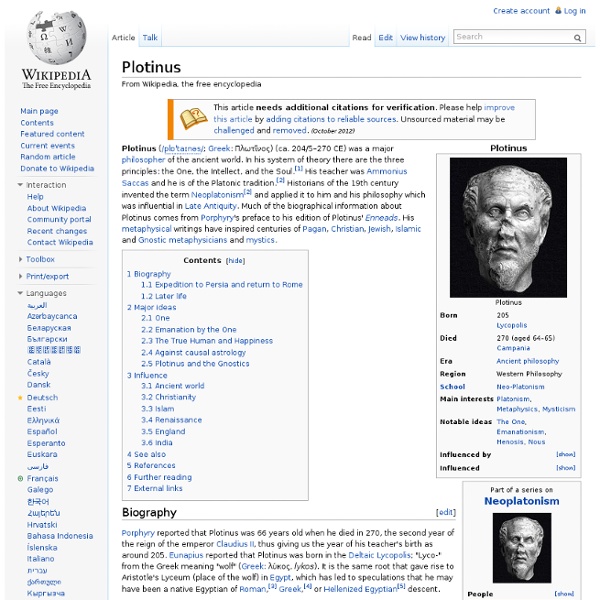Plutarch
Plutarch (/ˈpluːtɑrk/; Greek: Πλούταρχος, Ploútarkhos, Koine Greek: [plǔːtarkʰos]; later named, on his becoming a Roman citizen, Lucius Mestrius Plutarchus (Λούκιος Μέστριος Πλούταρχος);[a] c. 46 – 120 AD),[1] was a Greek historian, biographer, and essayist, known primarily for his Parallel Lives and Moralia.[2] He is considered today to be a Middle Platonist. Early life[edit] Ruins of the Temple of Apollo at Delphi, where Plutarch served as one of the priests responsible for interpreting the predictions of the oracle. Plutarch was born to a prominent family in the small town of Chaeronea about twenty miles east of Delphi in the Greek region known as Boeotia. His family was wealthy.
Amelius
Amelius (/əˈmiːliəs/; Greek: Ἀμέλιος), whose family name was Gentilianus, was a Neoplatonist philosopher and writer of the second half of the 3rd century. Biography[edit] Amelius was not his original name; he seems to have chosen it to express his contempt for worldly things, as the word ἀμέλεια (ameleia) means negligence in Greek. Porphyry stated of Amelius in the Life of Plotinus, "Amelius preferred to call himself Amerius, changing L for R, because, as he explained, it suited him better to be named from Amereia, Unification, than from Ameleia, Indifference."[1]
Francis Bacon
English philosopher and statesman Francis Bacon, 1st Viscount St Alban,[a] Kt PC QC (;[5] 22 January 1561 – 9 April 1626), also known as Lord Verulam, was an English philosopher and statesman who served as Attorney General and as Lord Chancellor of England. His works are credited with developing the scientific method and remained influential through the scientific revolution.[6] Francis Bacon was a patron of libraries and developed a functional system for the cataloguing of books by dividing them into three categories—history, poetry, and philosophy—which could further be divided into more specific subjects and subheadings. Bacon was educated at Trinity College, Cambridge, where he rigorously followed the medieval curriculum, largely in Latin.
Lucius Aemilius Paullus Macedonicus
2nd-century BC Roman consul and general Lucius Aemilius Paullus Macedonicus (c. 229 BC – 160 BC) was a two-time consul of the Roman Republic and a noted general who conquered Macedon, putting an end to the Antigonid dynasty in the Third Macedonian War. Family[edit]
Johann Wolfgang von Goethe
18th/19th-century German writer, artist, and politician A literary celebrity by the age of 25, Goethe was ennobled by the Duke of Saxe-Weimar, Karl August, in 1782 after taking up residence in Weimar in November 1775 following the success of his first novel, The Sorrows of Young Werther (1774). He was an early participant in the Sturm und Drang literary movement. During his first ten years in Weimar, Goethe became a member of the Duke's privy council, sat on the war and highway commissions, oversaw the reopening of silver mines in nearby Ilmenau, and implemented a series of administrative reforms at the University of Jena.
Eutocius of Ascalon
Eutocius of Ascalon (/juːˈtoʊʃəs/; Greek: Εὐτόκιος ὁ Ἀσκαλωνίτης; c. 480 – c. 540) was a Greek mathematician who wrote commentaries on several Archimedean treatises and on the Apollonian Conics. Life and work[edit] Little is known about the life of Eutocius.
Bettina von Arnim
19th-century German writer Bettina von Arnim (the Countess of Arnim) (4 April 1785 – 20 January 1859),[1] born Elisabeth Catharina Ludovica Magdalena Brentano, was a German writer and novelist. Bettina (as well: Bettine) Brentano was a writer, publisher, composer, singer, visual artist, an illustrator, patron of young talent, and a social activist.
FANDOM powered by Wikia
Atlantis (in Greek, Ἀτλαντὶς νῆσος, "island of Atlas") is the name of a legendary island first mentioned in Plato's dialogues Timaeus and Critias. In Plato's account, Atlantis, lying "beyond the pillars of Heracles", was a naval power that conquered many parts of Western Europe and Africa 9,000 years before the time of Solon, or approximately 9500 BC. After a failed attempt to invade Athens, Atlantis sank into the ocean "in a single day and night of misfortune". As a story embedded in Plato's dialogues, Atlantis is generally seen as a myth created by Plato to illustrate his political theories. Although the function of the story of Atlantis seems clear to most scholars, they dispute whether and how much Plato's account was inspired by older traditions.
Hamlet
tragedy by William Shakespeare Hamlet is considered among the most powerful and influential works of world literature, with a story capable of "seemingly endless retelling and adaptation by others". It was one of Shakespeare's most popular works during his lifetime and still ranks among his most performed, topping the performance list of the Royal Shakespeare Company and its predecessors in Stratford-upon-Avon since 1879. It has inspired many other writers—from Johann Wolfgang von Goethe and Charles Dickens to James Joyce and Iris Murdoch—and has been described as "the world's most filmed story after Cinderella". The story of Shakespeare's Hamlet was derived from the legend of Amleth, preserved by 13th-century chronicler Saxo Grammaticus in his Gesta Danorum, as subsequently retold by the 16th-century scholar François de Belleforest.



